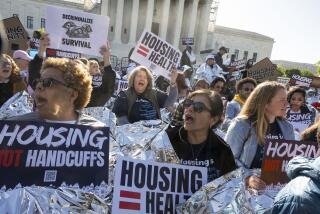Supreme Court divided on homelessness case that will affect California encampment policy

Supreme Court justices sounded sharply split Monday over whether to give cities in the West more authority to restrict homeless encampments on sidewalks and other public property.
The court’s three liberals said they were wary of giving cities a broad and unchecked power to use arrests and fines to punish homeless people who are sleeping outside.
“Sleeping is a biological necessity,” Justice Elena Kagan said. It “seems like you are criminalizing the status of homelessness,” she told a lawyer representing the city of Grants Pass, Ore.
But conservatives, led by Chief Justice John G. Roberts Jr., said they were skeptical of treating homelessness as a status that deserves constitutional protection.
People can be homeless for one week and find shelter the next week. “You can move into and out of that status,” he said.
He also questioned why judges or the justices, rather than city officials, should decide how to cope with the problem of homelessness.
“Why would you think these nine people are the best people to judge and weigh those policy judgments?,” he asked one attorney.
For more than two hours, the justices and attorneys argued back and forth on whether homeless people should be protected from city laws that could punish them because they have nowhere to sleep.
Los Angeles-based attorney Theane Evangelis, representing the Oregon city, said the problem of homelessness has been made worse in the West because of U.S. 9th Circuit Court of Appeals rulings that found it was unconstitutional for cities to impose fines or other punishments on homeless people who sleep outdoors. No other federal appellate court in the nation has followed suit.
She began by urging the justices to “end the 9th Circuit’s failed experiment.” She said cities should have the flexibility to enforce ordinances that limit where people can sleep and camp.
It was unclear that there was a solid majority to overturn the 9th Circuit entirely; some justices appeared to favor a middle-ground approach.
That would allow cities to regulate where people can sleep outside, but it would not prohibit camping or sleeping throughout the city.
Deputy U.S. Solicitor Gen. Edwin Kneedler urged the court to adopt that approach. Although cities should not make it a crime for homeless people to sleep outdoors, cities should have “flexibility to enforce” reasonable restrictions on where homeless people can sleep, he said.
Many cities in California, including Los Angeles, generally follow that approach. Gov. Gavin Newsom has also advocated “reasonable limits on public camping.”
Justices Brett M. Kavanaugh and Amy Coney Barrett may hold the deciding votes. Both questioned laws that would punish homeless people for sleeping outdoors.
“How does this law help?,” he asked. “You end up in jail for 30 days, then you get out, I mean, you’re not going to be any better off than you were before in finding a bed if there aren’t any available.”
The attorney for Grants Pass explained the difficulty of finding shelter for some of the other homeless people. She said Gloria Johnson, the lead plaintiff, refused to stay at the Gospel Rescue Mission because her dog could not stay there as well.
In their later questions, both Kavanaugh and Barrett said they doubted the wisdom of having federal judges “micromanage” a city’s policies for coping with homelessness.
The case of Grants Pass vs. Johnson is the most important dispute over homelessness to come before the high court.
At issue is whether the Constitution protects the rights of homeless people who camp on sidewalks or in parks.
Advocates on both sides said their opponents were arguing an extreme position.
Lawyers who sued on behalf of three homeless people said Grants Pass was seeking to “banish” from the city poor people who were homeless. They said one city ordinance made it a crime to sleep on the sidewalk with a blanket. Moreover, the city offered little or no shelter for the homeless, they said.
Meanwhile, city officials said they had been denied the authority to enforce common ordinances that forbid camping or sleeping in sidewalks or parks.
Since 2018, the San Francisco-based 9th Circuit has held that it is cruel and unusual punishment for cities or their police to arrest or fine people who sleep in public because they have nowhere else to go.
City attorneys say those rulings have led to the growth of homeless encampments in California and the West, and they urged the justices to overturn the 9th Circuit. They hope for a ruling that would clarify the scope of the city’s enforcement authority.
Advocates for homeless people said they feared that a ruling in favor of Grants Pass would allow cities to make it a crime for poor people to sleep outside.
The justices will meet behind close doors Thursday to vote on how to decide the case, and they are likely to hand down a ruling in late June.
More to Read
Get the L.A. Times Politics newsletter
Deeply reported insights into legislation, politics and policy from Sacramento, Washington and beyond. In your inbox three times per week.
You may occasionally receive promotional content from the Los Angeles Times.







